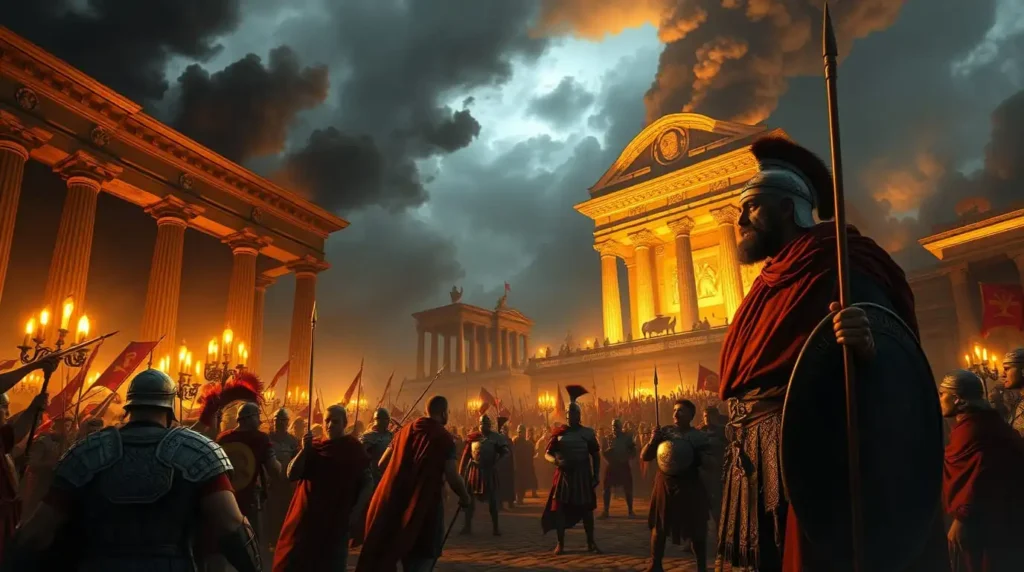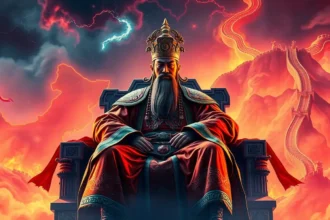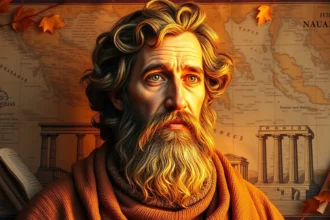In the annals of Roman history, certain names loom large: Julius Caesar, Augustus, Constantine the Great. Others, like Magnus Maximus, reside in the shadows, remembered primarily for their fleeting moments of power or dramatic downfalls. Yet Magnus Maximus, a 4th-century Roman usurper-turned-emperor, left an indelible mark on both the Roman Empire and the regions that would one day become Britain and Western Europe. His life is a tale of ambition, power, and the fragile nature of imperial authority.
History will be kind to me, for I intend to write it.
Winston Churchill
The Early Life of Magnus Maximus
Magnus Maximus was born around 335 CE in the province of Hispania, which corresponds to modern-day Spain and Portugal. His name, which translates to “Greatest the Greatest,” might hint at the high aspirations his family had for him—or perhaps, the ambitions he cultivated himself.

Much of Maximus’s early life is shrouded in mystery, though it is believed he came from a prominent military family. This background likely provided him the connections and training necessary to rise through the Roman army’s ranks. By the mid-4th century, the Roman Empire faced constant external threats from barbarian tribes, including the Goths and Picts, and internal divisions caused by rival claimants to the throne. In this turbulent context, Maximus emerged as a capable and ambitious leader.
Rise to Power in Britannia
Maximus’s career took a significant turn when he was posted to Britain in the 370s. At the time, the province was under siege by various threats, including raids by the Picts from the north, Saxons from the east, and Irish tribes to the west. Serving under Count Theodosius, the father of the future emperor Theodosius I, Maximus played a key role in defending and stabilizing the province.
In 383 CE, dissatisfaction with Emperor Gratian in the Western Roman Empire created an opportunity for Maximus. Gratian, known for his favoritism toward his personal bodyguard of Alans (a nomadic people), had alienated much of the Roman military. Maximus, likely supported by his troops in Britain, declared himself emperor and led his army across the English Channel to Gaul.
Gratian fled but was eventually captured and executed, leaving Maximus in control of Britain, Gaul, and Hispania. To legitimize his rule, Maximus sought recognition from Theodosius I, the Eastern Roman Emperor. Initially, Theodosius acquiesced, granting Maximus authority over the Western provinces while retaining control of Italy and Africa for Gratian’s young half-brother, Valentinian II.
The Rule of Magnus Maximus
For a brief period, Maximus brought stability and strength to the territories under his control. He established his capital at Trier in modern-day Germany, a strategic location that allowed him to oversee the Western provinces effectively. Coins minted during his reign bear inscriptions celebrating his virtues, emphasizing his role as a defender of the empire and the Christian faith.

Maximus was also notable for his support of orthodox Christianity during a time of significant theological conflict. The 4th century was marked by debates over the nature of Christ, particularly between Nicene Christians and various heretical groups, including the Arians. Maximus aligned himself with the Nicene Creed, earning the support of influential bishops.
However, his reign was not without controversy. In his pursuit of religious orthodoxy, Maximus clashed with Priscillian, a bishop in Hispania accused of heresy. When Priscillian was convicted and executed in 385 CE—likely the first Christian bishop to be executed for heresy—it sparked outrage among some contemporaries. The incident highlighted the growing entanglement of church and state in the later Roman Empire.
The Downfall of Magnus Maximus
Maximus’s downfall was precipitated by his ambition. By 387 CE, tensions between him and Valentinian II, who still ruled Italy and Africa under Theodosius’s protection, reached a boiling point. Maximus invaded Italy, forcing Valentinian to flee to the Eastern Roman court.
Uneasy lies the head that wears a crown.
William Shakespeare, Henry IV, Part II
Theodosius I could not tolerate this breach of their earlier agreement. Declaring war, he marched west with a formidable army, bolstered by Gothic mercenaries. In 388 CE, Theodosius confronted Maximus near the city of Aquileia in northern Italy. After a decisive battle, Maximus was defeated, captured, and executed.
Legacy and Impact
Though his reign was brief, Magnus Maximus left a lasting legacy in several ways. In Britain, his departure in 383 CE marked a turning point in the province’s history. He took many Roman troops with him on his campaign, weakening the island’s defenses and paving the way for increased Saxon incursions in the following decades.

In the cultural memory of Wales and Brittany, Maximus became a legendary figure. Welsh tradition refers to him as “Macsen Wledig,” a ruler who founded dynasties and played a key role in the migration of Britons to Brittany. These stories, though largely mythical, reflect the enduring impact of his reign on the region’s collective imagination.
Maximus’s execution of Priscillian also set a troubling precedent for the use of state power in religious disputes. While the Roman Empire had previously persecuted Christians under pagan emperors, Maximus’s actions demonstrated that Christian rulers could wield their authority just as ruthlessly against dissenting factions within their own faith.
A Cautionary Tale
The story of Magnus Maximus serves as a cautionary tale about the perils of ambition in an era of constant political upheaval. His rise to power demonstrated the volatility of the late Roman Empire, where military support could propel a man to the throne as quickly as it could lead to his downfall.
Yet Maximus was more than just a usurper. He was a competent general and administrator who managed to rule vast territories effectively for five years. His alignment with Nicene Christianity and his defense of the Western provinces reflect the complexity of his legacy—a mixture of pragmatism, religious fervor, and personal ambition.
In the end, Magnus Maximus occupies a unique place in history: a figure whose ambitions briefly reshaped the Roman world but ultimately crumbled under the weight of imperial politics. While he may not enjoy the same renown as other Roman emperors, his story continues to intrigue historians and inspire tales in the lands he once ruled.
Magnus Maximus reminds us that history is not solely the domain of the victors. It is also shaped by those who dared to seize power, however fleeting their reign may have been. His life, a blend of ambition and tragedy, stands as a testament to the turbulent and transformative final centuries of the Roman Empire.
Additional Resources
Certainly! Here are additional resources to further explore the life and times of Magnus Maximus:
Books and Biographies
- The Roman Empire: A Very Short Introduction by Christopher Kelly
Provides an accessible overview of the Roman Empire, including figures like Magnus Maximus. - The Fall of the Roman Empire: A New History by Peter Heather
Offers insights into the decline of the Western Roman Empire, contextualizing Maximus’s role.
Online Articles and Analysis
Magnus Maximus | Roman General, Britain, Wales – Britannica
A concise biography of Magnus Maximus, highlighting his military and political career.
Magnus Maximus – World History Encyclopedia
An article detailing the life and impact of Magnus Maximus.
Documentaries and Videos
- “The Roman Empire: Magnus Maximus to Honorius”
A documentary exploring the period from Magnus Maximus’s reign to that of Honorius.
- “Magnus Maximus: The Man Who Tried to Reclaim the West”
A video delving into the life and ambitions of Magnus Maximus.
Academic Articles and Journals
- Magnus Maximus: The End of Roman Britain?
An academic exploration of Maximus’s impact on Roman Britain. - Usurpation and Legitimacy in the Late Roman Empire
A scholarly article examining the phenomenon of usurpation and how figures like Maximus sought legitimacy.
Interactive Resources
- Magnus Maximus – Wikipedia
An in-depth article with links to related topics and further reading. - Magnus Maximus – World History Encyclopedia
Provides detailed information and related resources on Magnus Maximus.
These resources offer a comprehensive starting point for delving deeper into the historical significance of Magnus Maximus.
Must Read : Fyodor Dostoevsky












